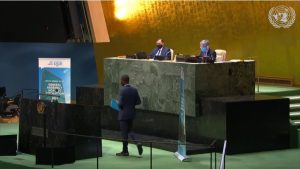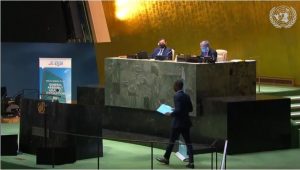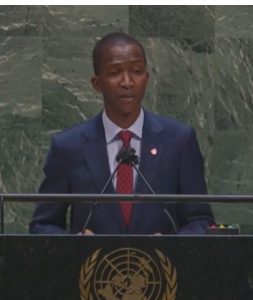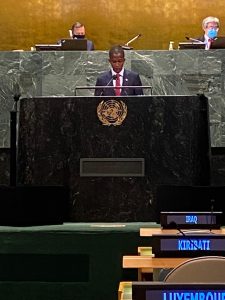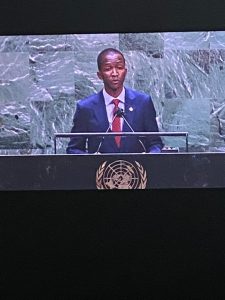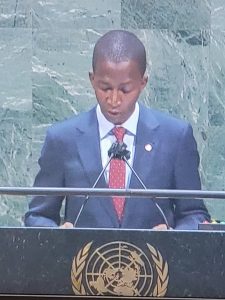Chairman of the Economic and Financial Crimes Commission, Abdulrasheed Bawa, has called for a simplified way of repatriating looted funds across the globe.
He made the call at the United Nations General Assembly Session on Corruption.
Read the full text here…
Mr. President, Let me at the onset thank you for convening this very important meeting.
Nigeria welcomes the opportunity to speak at this special session and present its perspective given the importance of international cooperation in preventing and combating corruption.
Corruption across national borders has huge negative impacts on the stability, peace, and economic prospects of millions, particularly in developing countries.
Corruption remains one of the most pervasive and daunting challenges facing humanity. It deprives national Governments of resources needed for sustainable development and facilitates illicit financial flows (IFFs) from developing economies to developed Countries thus, weakening states’ ability to deliver developmental expectations targeted at women and youths.
Nigeria, like many other countries, has suffered from the damaging effects of corruption. The Country has lost billions of dollars to foreign tax havens, stolen and expatriated by corrupt leaders and their foreign accomplices including multinational companies.
However, since the return of democracy in 1999, Nigeria has prioritized the fight against corruption and established anti-corruption Agencies such as the Economic and Financial Crimes Commission, Independent Corrupt Practices and Other Related Offences Commission, Nigerian Financial Intelligence Unit and the Code of Conduct Bureau to lead the fight against graft.
Nigeria under the leadership of His Excellency, President Muhammadu Buhari, GCFR, has made the fight against corruption one of the cardinal objectives of the administration. CSOs, NGOs and whistle blowers are encouraged to join the fight against corruption and contribute their quota in that regard. One instance of such whistle blowing led to the recovery of $43m.
Public corruption is being exposed by the day and several Politically Exposed Persons have been and are being prosecuted and divested of their illicit assets.
We have been engaging with International Law Enforcement Agencies around the world and some of the collaboration has led to the recovery and repatriation of stolen funds including the recent return of the 4.2million Pounds by the UK Government that was stolen from Nigeria by a former Governor.
Procurement processes have been strengthened and activities of the Gate Keepers are being monitored through the Special Control Unit Against Money Laundering to serve as deterrence to the stealing of public funds. Policies have been introduced to mitigate revenue leakages including the development of the National Anti-Corruption Strategy (NACS).
The NACS is developed with 5 identified cardinal pillars on prevention, public engagement, ethical re-orientation, enforcement & sanctions and recovery & management of stolen assets/proceeds of crime.
The strategy is aimed at providing a national road map in the fight against corruption.
Nigeria has sustained her commitment to the social re-use of recovered assets as demonstrated in the funding of major road infrastructure projects and other social initiatives consisting of cash transfers to the most vulnerable groups, school meals and funding of micro-credit schemes.
Mr. President, Nigeria has participated in the first and second review cycles of the UNCAC implementation review process as a reviewing and reviewed State. It has enacted a Mutual Legal Assistance Law in line with the recommendations from the review process.
Recently, the Parliament launched the 2021 Legislative Anti-Corruption Agenda (LACS 2021) which seeks to provide a clear road map for a reform based legislative intervention to prevent and combat corruption and financial crimes in Nigeria.
Some of the bills before the Parliament include the Witness Protection Bill, Proceeds of Crime (POCA), Bill and Public Interest Disclosure and Complaints Commission Bill.
The systemic imbalances and institutional deficiencies in the global tax treaties and structures, framed when most developing countries were under foreign rule in many respects continue to occur and give rise to a tax regime that is unsuited for the current era, and thus hindering effective measures at combating tax abuses, especially by multinational corporations.
Now more than ever, Governments at all levels must rise to their responsibility and continue to commit to transparency and accountability in public expenditure. Measures must be introduced to mitigate the continuous flow of illicit funds from least developed to developed countries. State Parties must continue to commit to the timely return of illicit assets and ensure implementation of effective anti-money laundering measures by International Financial Centers.
Nigeria further highlights the very beneficial use of “settlements” or “non-trial resolutions” to ensure the disgorgement of illicit gains from corrupt acts. It calls on Jurisdictions negotiating settlements to, in a timely manner, inform affected jurisdictions that a negotiation toward a settlement is taking place, and proactively share information on concluded settlements. We are pleased that the UNGASS Political Declaration reiterated previous resolutions on settlements and urge states to fully cooperate in this regard.
Nigeria therefore calls for a multifaceted approach in addressing illicit financial flows as recommended by the High Level Panel Report on International Financial Accountability, Transparency and Integrity for Achieving the 2030 Agenda (FACTI Panel). The Report provides paths to financial integrity for sustainable development, strongly showing how to redirect the resources lost from illicit flows to finance the implementation of the 2030 Agenda and the achievement of the SDGs.
Nigeria further calls for the simplification of evidentiary requirements and other mutual legal assistance procedures to seize, confiscate and repatriate proceeds of corruption, as appropriate, to enhance international cooperation for timely recovery and return of assets.
In concluding let me reiterate that the fight against Illicit Financial Flows is urgent and important in our collective efforts to address corruption. We remain committed in our efforts to track, investigate and prosecute corrupt individuals and entities and repatriate such funds and assets to their countries of origin.
Nigeria looks forward to the full implementation of all the commitments expressed in the Political Declaration, particularly on Asset Recovery and return, to support development financing as well as the implementation of the agenda 2030 for sustainable development.
I thank you for your attention.
